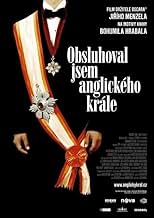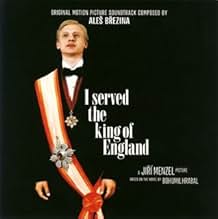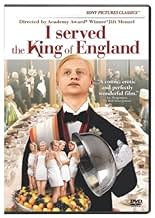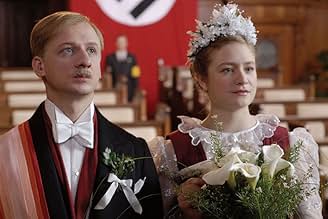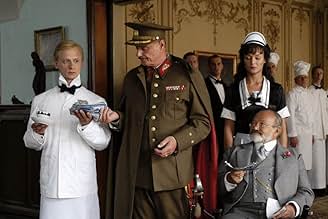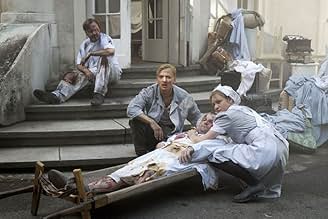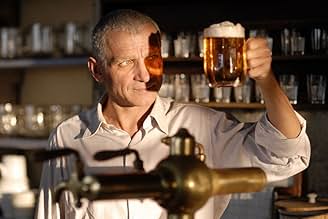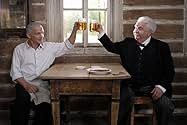AVALIAÇÃO DA IMDb
7,3/10
8,4 mil
SUA AVALIAÇÃO
Adicionar um enredo no seu idiomaA look at the glamorous life at an old-world Prague hotel.A look at the glamorous life at an old-world Prague hotel.A look at the glamorous life at an old-world Prague hotel.
- Direção
- Roteiristas
- Artistas
- Prêmios
- 12 vitórias e 13 indicações no total
- Direção
- Roteiristas
- Elenco e equipe completos
- Produção, bilheteria e muito mais no IMDbPro
Avaliações em destaque
this is a farce in part, but i do wonder why there's the great American need to qualify this movie. so one will know the correct response, perhaps? aw, just sit back and be enlightened. if more folks had laughed at the Nazis they wouldn't have made it into power. and as for the woman being portrayed as lesser than the man, this is called history, folks. the movie is charming. barney is a mime's delight. and the sex is delicious, and certainly not raunchy as one reviewer on the DVD writes. i always find it stimulating to have to curb my love of MTV editing and car chases and to let the different pace of the European style wash over me. ah tempora, ah mores.
I got a bit of a shock when I saw this film. It doesn't seem to follow the rules of contemporary film-making--in other words, women aren't shown as fully equal to men (although they can be very resourceful in dealing with petty tyranny) and the hero shows no sign of resentment for the way he is treated. I felt a lot closer to the great works of the heyday of classic film by Cukor, Ophuls and Lubitsch. The story unfolds calmly and logically, whether the events take place in the 30's, 40's or 50's of the last century. Ivan Barnev as the young Jan is superb: funny, roguish and balletic (just watch how gracefully he swoops around the restaurant with that heavy tray; wonder how much rehearsal time that needed.) Jiri Menzel made Closely Watched Trains, then saw his career go into eclipse after the Soviet invasion in 1968. The work he has done since hasn't come to my attention until now. This may be his swan-song, since he is 70 now, but I hope not.
The works of Czech director Jiri Menzel constitute a tasty cocktail of humanism and laughter. In this film, the cocktail is personified in the words spoken by the narrator and lead character early in the film: "It was always my luck to run into bad luck." Menzel's innocent male country bumpkins have simplistic goals in life-get rich and charm the beautiful woman in their horizon. His films remind you of the social satire embedded in the works of Charles Chaplin and the visual gags in the cinema of Buster Keaton. Only Menzel's body of work has a dose of moral ambiguity.
While Menzel's cinema is often mistaken as being solely his own genius, he actually rides on the shoulders of three major literary giants of the former CzechoslovakiaBohumil Hrabal, Vladislaw Vancura, and Zedenek Sverak. Menzel's cinema provides a convenient "easy read." of the fine literary tradition to which Milan Kundera belongs by bringing alive on screen slivers of statements and observations recorded by these novelists. Menzel's true gift is making the written word look attractive on screen with the use of imaginative visual gags. The spoken words (the writer's contribution) and carefully chosen actors serve as the pivot to enjoy the visual feast in Menzel's cinema. His mastery of visual comedy has made a major difference to Czech cinema being associated with comedy rather than drama, quite unlike other East European cinema where tragedies and serious drama overshadowed the comedy genre.
This film happens to be the sixth work of Hrabal that Menzel has adapted on screen-the first being "Closely watched trains."
Politicians find satire uncomfortable. It is not surprising that Hrabal's novel "I served the King of England" was banned for years. When ultimately Menzel made it into a movie in 2006 using Hrabal's script, it won the FIPRESCI prize at Berlin. Menzel's cinema (and Hrabal's novels) has considerable political and social criticism. The film opens with clemency/pardon given to a prisoner who has almost completed his jail term. Communist political bigwigs wish to ape the capitalists, without a clue of what is required to gain social respect. Hrabal's script is clearly critical of the communist regime: "People who said social work was ennobling were the same men who drank all night and ate with lovely young women seated on their knees.' Butlers act superior to their new masters who do not know social etiquette. The new Czech communist politicos bend over backwards to please any one with the remotest Russian credentials. It is no small wonder that Hrabal got into trouble with the authorities until the political regime changed in recent years.
Apart from political criticism, social criticism of Czechs get liberally dished out in the film. When the physically short-statured waiter Jan Dite (literally translated as Johnny Child) throws coins on the floor for fun, rich and poor Czechs crawl without social distinction on the floor to pick up the money, allowing the short-statured waiter to look down at those he was serving and emerge physically and socially "tall" for a brief period. There is another line that Hrabal/Menzel uses to describe Czechs and their actions over the decades "Czechs do not fight warstherefore we were not invaded, we were annexed." These are lines that will make many laugh, but these lines could make the author/ the director unpopular with a few who cannot take self criticism.
The quest for money and riches underpin this film in particular and much of Menzel's cinema. The film has the lead character selling sausages at a railway station. So engrossed is he in counting the change he has to return to a customer who has given him a big bank note, that the train pulls out with the angry customer fuming that he has been cheated. But Hrabal and Menzel had together done a similar scene in "Closely watched trains" where a train pulls out as the young hero is about to kiss his love with eyes closed, taking away his beloved girl whose eyes are open and is agitated that the kiss was missed.
Money is a recurring theme in "I served the King of England." The hero dreams of being a millionaire. One colorful character keeps himself amused spreading out cash on the floor like a carpet. Money is what waiter's get if he is good and smart, enough to buy up the hotel. He gets a medal from an Ethiopian Head of State, modeled on the physical attributes of Haile Selassie; merely because he can bend down to receive it. He gets a fat tip because he is physically near to a rich guest doling out his largesse.
After one has laughed sufficiently, one could reflect on the less obvious but darker side of Hrabal/Menzel's contribution to cinema. The women are lovely to look at. They bear a striking common factorthey are to be won. They are to be used, often as useful commodities. One Nazi girl even makes love, thinking of Hitler during the act. You do not see Hrabal and Menzel developing the women characters as they do their male ones. In this film, the anti-hero is dismissed from his job because he is not a good Czech.
"I served the King of England" are the spoken credentials of a respected waiter in the film as he trains the lead character of the film. Yet, the film is about a successful Czech who became a millionaire as he had dreamt, who married a Nazi and had enjoyed life when other Czechs were being led to the gas chambers, and was imprisoned when the Communists came to power. Hrabal and Menzel may have given us great comedy over six films. Evaluate the content closely and there is more to their work than pure comedy.
While Menzel's cinema is often mistaken as being solely his own genius, he actually rides on the shoulders of three major literary giants of the former CzechoslovakiaBohumil Hrabal, Vladislaw Vancura, and Zedenek Sverak. Menzel's cinema provides a convenient "easy read." of the fine literary tradition to which Milan Kundera belongs by bringing alive on screen slivers of statements and observations recorded by these novelists. Menzel's true gift is making the written word look attractive on screen with the use of imaginative visual gags. The spoken words (the writer's contribution) and carefully chosen actors serve as the pivot to enjoy the visual feast in Menzel's cinema. His mastery of visual comedy has made a major difference to Czech cinema being associated with comedy rather than drama, quite unlike other East European cinema where tragedies and serious drama overshadowed the comedy genre.
This film happens to be the sixth work of Hrabal that Menzel has adapted on screen-the first being "Closely watched trains."
Politicians find satire uncomfortable. It is not surprising that Hrabal's novel "I served the King of England" was banned for years. When ultimately Menzel made it into a movie in 2006 using Hrabal's script, it won the FIPRESCI prize at Berlin. Menzel's cinema (and Hrabal's novels) has considerable political and social criticism. The film opens with clemency/pardon given to a prisoner who has almost completed his jail term. Communist political bigwigs wish to ape the capitalists, without a clue of what is required to gain social respect. Hrabal's script is clearly critical of the communist regime: "People who said social work was ennobling were the same men who drank all night and ate with lovely young women seated on their knees.' Butlers act superior to their new masters who do not know social etiquette. The new Czech communist politicos bend over backwards to please any one with the remotest Russian credentials. It is no small wonder that Hrabal got into trouble with the authorities until the political regime changed in recent years.
Apart from political criticism, social criticism of Czechs get liberally dished out in the film. When the physically short-statured waiter Jan Dite (literally translated as Johnny Child) throws coins on the floor for fun, rich and poor Czechs crawl without social distinction on the floor to pick up the money, allowing the short-statured waiter to look down at those he was serving and emerge physically and socially "tall" for a brief period. There is another line that Hrabal/Menzel uses to describe Czechs and their actions over the decades "Czechs do not fight warstherefore we were not invaded, we were annexed." These are lines that will make many laugh, but these lines could make the author/ the director unpopular with a few who cannot take self criticism.
The quest for money and riches underpin this film in particular and much of Menzel's cinema. The film has the lead character selling sausages at a railway station. So engrossed is he in counting the change he has to return to a customer who has given him a big bank note, that the train pulls out with the angry customer fuming that he has been cheated. But Hrabal and Menzel had together done a similar scene in "Closely watched trains" where a train pulls out as the young hero is about to kiss his love with eyes closed, taking away his beloved girl whose eyes are open and is agitated that the kiss was missed.
Money is a recurring theme in "I served the King of England." The hero dreams of being a millionaire. One colorful character keeps himself amused spreading out cash on the floor like a carpet. Money is what waiter's get if he is good and smart, enough to buy up the hotel. He gets a medal from an Ethiopian Head of State, modeled on the physical attributes of Haile Selassie; merely because he can bend down to receive it. He gets a fat tip because he is physically near to a rich guest doling out his largesse.
After one has laughed sufficiently, one could reflect on the less obvious but darker side of Hrabal/Menzel's contribution to cinema. The women are lovely to look at. They bear a striking common factorthey are to be won. They are to be used, often as useful commodities. One Nazi girl even makes love, thinking of Hitler during the act. You do not see Hrabal and Menzel developing the women characters as they do their male ones. In this film, the anti-hero is dismissed from his job because he is not a good Czech.
"I served the King of England" are the spoken credentials of a respected waiter in the film as he trains the lead character of the film. Yet, the film is about a successful Czech who became a millionaire as he had dreamt, who married a Nazi and had enjoyed life when other Czechs were being led to the gas chambers, and was imprisoned when the Communists came to power. Hrabal and Menzel may have given us great comedy over six films. Evaluate the content closely and there is more to their work than pure comedy.
Obsluhoval jsem anglického krále (2006), written and directed by Jirí Menzel, is a Czech film shown in the U.S. with the title, "I Served the King of England." Menzel directed "Closely Watched Trains," one of the great movies of the 1960's.
Using flash forwards and flash backs, we follow the life of Jan Díte, played as a young man by Ivan Barnev, and as an older man by Oldrich Kaiser. Díte is obsessed with becoming a millionaire, and the younger Díte manages to accomplish this goal by his total unconcern for the plight of his country and his fellow Czechs.
When the Germans invade Sudetenland, and then the rest of Czechoslovakia, Díte takes it all in stride, calmly embracing--figuratively--the Nazi invaders and--literally--a lovely young Nazi woman. I think we are supposed to perceive him as naive and innocent, but my interpretation is that he is willfully ignorant and basically uncaring. My mother always said, "There are none so blind as those who will not see." That quote perfectly fits Díte's character.
The film has some comic moments, and the views of Prague are lovely. The movie is worth watching if the opportunity arises, but not worth strenuously seeking out. We saw it at the Rochester High Falls International Film Festival. It will work well on DVD.
Using flash forwards and flash backs, we follow the life of Jan Díte, played as a young man by Ivan Barnev, and as an older man by Oldrich Kaiser. Díte is obsessed with becoming a millionaire, and the younger Díte manages to accomplish this goal by his total unconcern for the plight of his country and his fellow Czechs.
When the Germans invade Sudetenland, and then the rest of Czechoslovakia, Díte takes it all in stride, calmly embracing--figuratively--the Nazi invaders and--literally--a lovely young Nazi woman. I think we are supposed to perceive him as naive and innocent, but my interpretation is that he is willfully ignorant and basically uncaring. My mother always said, "There are none so blind as those who will not see." That quote perfectly fits Díte's character.
The film has some comic moments, and the views of Prague are lovely. The movie is worth watching if the opportunity arises, but not worth strenuously seeking out. We saw it at the Rochester High Falls International Film Festival. It will work well on DVD.
Menzel's film is a modern masterpiece. It tells the story of one man's fate, as seen through the mythical pen of Bohumil Hrabal, one of the greatest Czech writers of the 20th century. The film is interspersed with documentary footage of the occupation of the remnants of the Czech republic in 1939. It tells how one man grows up in one system, survives another, and willingly submits himself to a third (Communist). The slogan "my happiness was always in the fact that some unhappiness overtook me" belongs to the East European theater of the absurd. For those of you who have seen the amazing performance of Julia Jentsch in "Sophie Scholl - The Last Days" it will come as a surprise, if not a shock, to see Ms. Jentsch play a character exactly opposite to the one which brought her such fame -- a true blue Nazi! But that's what great actors are made of -- anti-Nazi heroine this year, Nazi lover of the main protagonist the next. She learned some Czech for this role, but when she speaks in German, the screen shows Czech subtitles. Some scenes are really priceless, as when Dite is escorted out of his hotel (presumably in 1948), by two members of the Communist people's militia who at first are inclined to allow him to stay on as administrator of his now nationalized enterprise, but when he keeps insisting he is a millionaire and needs to be arrested, they willingly oblige. Irony stays with us through the film, starting with the opening scene when the elder Dite is released from a Communist jail in Prague and he explains: "I was sentenced to 15 years (for being a millionaire), but because of the amnesty, I only had to sit for 14 and 3/4."
Você sabia?
- CuriosidadesThe scenes for the Hotel Pariz restaurant were filmed in the main restaurant in Prague's Obecni Dum (Civic House), just around the corner from the actual Hotel Pariz. Both restaurants were designed in the Art Nouveau style by artist Alphons Mucha, but the Obecni Dum restaurant is larger.
- Erros de gravaçãoJan sees a train full of people being deported to a concentration camp. A closeup of one of the cars shows men within wearing gray and white striped uniforms. However, deportees were sent to the camps wearing their civilian clothes and weren't issued uniforms until after they arrived.
- Citações
Jan Díte, older: A person becomes most human, often against his own will, when he begins to founder, when he is derailed and deprived of order.
- ConexõesEdited into CzechMate: In Search of Jirí Menzel (2018)
Principais escolhas
Faça login para avaliar e ver a lista de recomendações personalizadas
- How long is I Served the King of England?Fornecido pela Alexa
Detalhes
- Data de lançamento
- Países de origem
- Centrais de atendimento oficiais
- Idiomas
- Também conhecido como
- I Served the King of England
- Locações de filme
- Empresas de produção
- Consulte mais créditos da empresa na IMDbPro
Bilheteria
- Orçamento
- CZK 84.450.000 (estimativa)
- Faturamento bruto nos EUA e Canadá
- US$ 617.403
- Fim de semana de estreia nos EUA e Canadá
- US$ 53.218
- 31 de ago. de 2008
- Faturamento bruto mundial
- US$ 7.354.478
- Tempo de duração1 hora 53 minutos
- Cor
- Mixagem de som
- Proporção
- 1.85 : 1
Contribua para esta página
Sugerir uma alteração ou adicionar conteúdo ausente

Principal brecha
By what name was Eu Servi o Rei da Inglaterra (2006) officially released in Canada in English?
Responda

